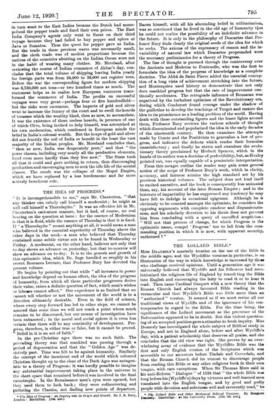THE IDEA OF PROGRESS.*
" IT is incomprehensible to me," says Mr. Chesterton, " that any thinker can calmly call himself a modernist ; he might as well call himself a Thursdayite." It was an effective hit in Mr. Chesterton's caricature manner, but it had, of course, no real bearing on the question at issue : for the essence of Modernism is that it is fluid, while the essence of Thursday is that it is fixed. If " a Thursdayite " meant anything at all, it would mean a man
ho believed in the essential superiority of Thursday above the other days in the week—a man who believed that Thursday contained some subtle virtue not to be found in Wednesday or Friday. A modernist, on the other hand, believes not only that to-day shows an advance on yesterday, but that to-morrow will show an advance on to-day. It is to the genesis and growth of this optimistic idea, which Dr. Inge handled so roughly in his recent Romans Lecture, that Professor Bury has devoted the present volume.
He begins by pointing out that while " all increases in power
and knowledge depend on human effort, the idea of the progress of humanity, from which all these particular progresses derive their value, raises a definite question of fact, which man's wishes or labours cannot affect." Our experience is so limited that we cannot tell whether or not the movement of the world is in a direction ultimately desirable. Even in the field of science, where every step forward has led to other steps, we cannot be assured that some time we will not reach a point where much remains to be discovered, but our means of investigation have been exhausted ; in the moral and social sphere it is even less certain that there will be any continuity of development. Pro- Fess, therefore, is either true or false, but it cannot be proved.
Belief in it is an act of faith."
In the pre-Christian ages there was no such faith. The pervading theory was that mankind was passing through a period of degeneration and that the " Golden Age " was de- cisively past. Time was felt to be against humanity. Similarly the concept of the imminent end of the world which coloured Christian thought up to the close of the Dark Ages was antagon- istic to a theory of Progress : it was hardly possible to imagine any substantial improvement taking place in the universe in the short space that remained before it was involved in the final catastrophe. In the Renaissance men's eyes were opened, but they used them to look back ; they were rediscovering and imitating the Classics, not finding new points of departure.
• The Idea of Progrue an Inquiry into its Origin and Growth. BY J. B. Bury. London : iacm1lIan. [14s. neLl
Bacon himself, with all his abounding belief in utilitarianism, was so convinced that he lived in the old age of humanity that he could not realize the possibility of an indefinite advance in the future. It is only in the philosophy of Descartes that Pro- fessor Bury finds clearly the original seeds of the idea for which he seeks. The axioms of the supremacy of reason and the in- variability of natural law which Descartes propounded were the necessary preliminaries for a theory of Progress.
The line of thought is pursued through the controversy over the Ancients and Moderns to Fontenelle, who was the first to formulate the idea of the progress of knowledge as a complete doctrine. The Abbe de Saint Pierre added the essential concep- tion of a long vista of achievement stretching into the future, and Montesquieu used history to demonstrate that not only does mankind progress but that the rate of improvement con- tinually accelerates. The retrograde influence of Rousseau was negatived by the turbulent optimism of the Revolutionary era, during which Condoroet found courage under the shadow of the guillotine to develop the teachings of Turgot and restore the idea to its prominence as a leading problem of the world. Having dealt with these outstanding figures and the lesser lights around them, Professor Bury reviews the various schools of thought which disseminated and popularized the idea in the early decades of the nineteenth century. He then examines the attempts made by Comte and the Positivists to generalize a law of pro- gress, and indicates the defects which render their formulae unsatisfactory ; and finally he states and examines the evolu- tionary theory proclaimed by Herbert Spencer, which in the hands of its author was a doctrine of perfectibility, but, as Huxley pointed out, was equally capable of a pessimistic interpretation.
From this meagre outline the reader may gain some general notion of the scope of Professor Bury's work, which in clarity, accuracy, and fairness attains the high standard set by his previous historical volumes. The subject does not lend itself to excited narrative, and the book is consequently less animated than, say, his account of the later Roman Empire ; and in the interests of impartiality he has suppressed any tendency he may have felt to indulge in occasional epigrams. Although he h obviously to be counted amongst the optimists, he considers the opposing arguments with complete candour and dispassionate- ness, and his scholarly devotion to his thesis does not prevent him from concluding with a query of unruffled scepticism : " Will not that process of change, for which Progress is the optimistic name, compel Progress ' too to fall from the com- manding position in which it is now, with apparent security, enthroned ? "






































 Previous page
Previous page